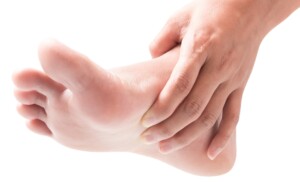
Where are your muscle twitching hot spots, and could this mean ALS?
If muscle twitching has you concerned, particularly the so-called hot spots, then keep reading.
Hot spots can grab your attention and cause a lot of worry and concern, since muscle twitching can be a symptom of a deadly disease.
If you’ve been worrying about twitching muscles, then you probably already know that the muscle twitching of this fatal disease may very well begin in one spot.
Fasciculations (fancy name for muscle twitching) have a lot of people terrified they have a dreadful disease.
Thus, any hot spot of fasciculations, understandably, may have you “freaking out” and panic-stricken over the possibility that your days are numbered.
But the phenomenon of hot spot muscle twitching is completely normal.
“Muscles may randomly twitch for many reasons, and most of the time you don’t even feel anything,” says Carolyn Dean, MD, ND, medical advisory board member of the Nutritional Magnesium Association at nutritionalmagnesium.org.
“They can twitch due to anxiety or stress, a sleepless night, too much coffee or after exercise.”

Shutterstock/Kiselev Andrey Valerevich
Next time one of your hot spots (or maybe you have only one muscle twitching hot spot) acts up, ask yourself:
“Where has it ever been engraved in stone that muscle twitching can’t occur in one spot; that fasciculations absolutely must occur at several different locations at once?”
Obviously if your fasciculations are occurring all over your body, it’s not likely you’ll fixate on any one particular fasciculation.
However, if only one muscle is twitching, say the arch of your foot or a calf, then this becomes very noticeable: This fasciculation steals the show and hogs the spotlight!
The most common sites for fasciculation hot spots are (no particular order):
Arches of feet
Calves
Thighs (quadriceps)
Thumbs
Toes
Eyelids
But this doesn’t mean that if you experience fasciculations at any other site, that you should worry. No sir.
Any voluntary muscle (a muscle that you can move or contract at will) is capable of twitching.
People have reported fasciculations in their chin, nose, forehead, neck, elbow area, butt and even tongue.
In fact, benign tongue fasciculations aren’t all that uncommon.
Name one person who can stick out their tongue and keep it perfectly still.
Perhaps the most common hot spots for fasciculations, however, may very possibly be the eyelids and arches of the feet.

Shutterstock/MRAORAOR
And this makes sense, when you consider all the work that eyelids and foot arches must do day in and day out.
How many times a day do you think your eyelids blink?
They work to keep airborne debris from irritating your eyes. Sometimes, eyelid muscles just get fatigued and twitch as a result.
Eye strain from reading too much or spending too much time before a computer can also incite eyelid twitching.
Foot arches go through a lot.
They support you when you walk. They try to accommodate all kinds of footwear, including high heels.

Shutterstock/Alexandr Makarov
Sometimes, the muscles in your foot arch just get tired and fatigued, and twitching results.
Calves, too, work hard.
Thus, it’s not surprising that hot spot fasciculations occurs in these areas, especially calves, feet, and thumbs — another body part that’s busy all day long.
“When muscle twitching becomes frequent or chronic, that’s when you begin to consider an underlying cause,” says Dr. Dean.
“The most common one is magnesium deficiency. Magnesium is responsible for muscle relaxation, and when you don’t have enough, then, its sister-mineral, calcium, causes muscle contraction.
“Too much calcium and not enough magnesium can cause ongoing twitching.”

Dr. Dean, in practice for 35+ years and author of “The Magnesium Miracle,” is also a naturopath, nutritionist, herbalist, acupuncturist, lecturer and consultant.
 Lorra Garrick has been covering medical, fitness and cybersecurity topics for many years, having written thousands of articles for print magazines and websites, including as a ghostwriter. She’s also a former ACE-certified personal trainer.
Lorra Garrick has been covering medical, fitness and cybersecurity topics for many years, having written thousands of articles for print magazines and websites, including as a ghostwriter. She’s also a former ACE-certified personal trainer.
.
Top image: Freepik.com pressfoto
Source: alsa.org/about-als/symptoms.html
ALS Muscle Twitching vs. BFS Muscle Twitches: Key Differences?


























